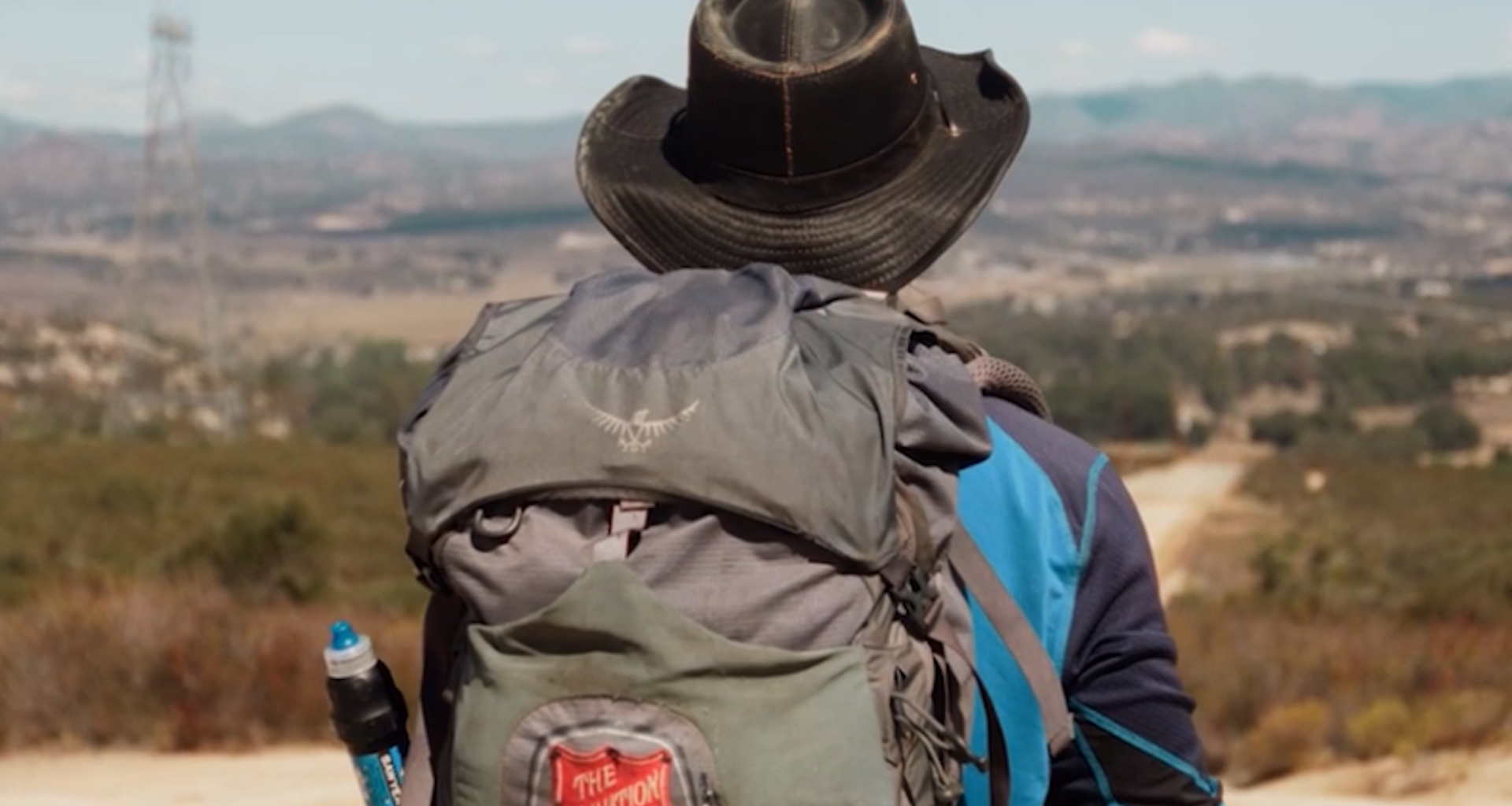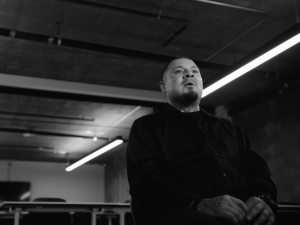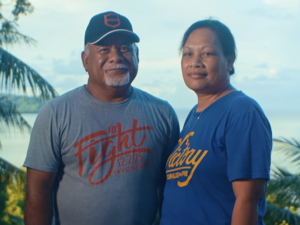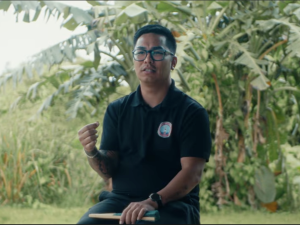The Pacific Crest Trail (PCT) is a hiking trail that runs from the border of Mexico, up through California, Oregon, and Washington, all the way to the border of Canada, spanning 2,650 miles. The journey takes, on average, about five months.
James Ihrig was in prison, lost in substance abuse for 18 years, when he learned about the PCT—and it lit a fire inside of him.
But even as hard as his life had been, hiking the entirety of the PCT would be perhaps the greatest challenge he’d ever faced.
Below is a transcript of the video, edited for readability.
James Ihrig: Crime was a big part of my life. So I was doing, like, 18 months in prison for stealing a car. And I was playing cards with the fellas, and I look over at the bookcase, and there’s this book, it’s called Wild, by Cheryl Strayed. And then when I got done losing playing cards, I took it back and started reading it. And when I was done reading it, I knew that that’s what I was going to do with my life. I was going to get out of prison and get sober, and then backpack the Pacific Crest Trail from Mexico to Canada. 2,655 miles.
I moved into sober living, got a job at Grocery Outlet, and just started saving every dollar I could get my hands on. And Matt, the guy I started with, he did the same. And so we put in for our permits, and with not enough money and no know-how, how to do this, we set off to San Diego.
I wasn’t prepared at all, not in the least. Like, I started with a chair, a cook stove, I had these little sandal flip flop things. You name it, I had it. It must have weighed 45 pounds, the day I started.
Captain Paul Swain: I asked them, how much preparation have you had? And obviously, you bought a lot of stuff, right? They had chairs and coffee pots and all this stuff, and they’re like, oh, they had gone, like, for two walks. They had done zero preparing for what turned out to be 20 miles a day. So I’m like, what in the world? So, to be honest with you, I didn’t know if they’d make it.
James Ihrig: It took us three days to do a one day section. So there’s all these little skinny people just hauling past us, and we’re like, “Oh, my goodness, what are we in for?” But, I was alive.
My whole life, I wasn’t resilient. I didn’t stick to nothing. If I was doing something, the smallest thing would take me off course. So I grew up in a farm community, called Goldendale, Washington. It’s farmers and cattle and horses. About the age of 15-16, got introduced into alcohol and drugs, and I could fit in.
The lifestyle, you only have to worry about one thing: it’s getting high, and staying high. I mean, it’s a terrible way to live, but that’s what I did for a long time. At one point in my life, I had pulled my stuff together enough to, to get married and have children, buy property, put a fence around it so the kids could run around and the dogs and everything. But I got back into opiates, and … all that disappeared.
So I came home after a long weekend of doing who-knows-what, and the kids were gone, my wife was gone, her ring was … on the counter. It was a feeling … the feeling I felt in that moment was of such despair that I’m surprised it didn’t kill me.
You know, most people might stop and try to fix everything, but no, I got worse. So if I had anything at that point, I continued to lose it all, which … I ended up on the streets, and I stayed there for a long time. I used drugs for 18 years. Like, seasons would pass, and I would still be there, on the streets. And so I was in and out of prison. Crime was a big part of my life. I couldn’t see no hope. Ever. For me. But … there is. There was.
700 miles, you get into the Sierra Nevada mountains. And we got into like three days of snow and five degrees weather, where we were soaking wet and cold. There’s going to be snow, covered with ice, covering the trail. And you got to get out your ice cleats, and your ice axe and you got to shimmy across.
I just prayed all day. I prayed for a step. I prayed for another step. I mean, it’s pretty intense terrain. And in the Sierra Nevadas, it’s 13,000 ft at its highest point, and so all day you’re going up, and up and up and up. The whole time you’re going up, you’re saying, “God, please don’t let me die up here.” Because people die out there every year.
The year I did it, five people died. And after that three days, Matt says to me, “Uh-uh, I’m not doing this anymore. You can have it. I’m sorry. I’m going home.” And it was after that that I began to struggle. Because I was alone. You know, for the first time in 800 miles, I was out there by myself.
I was scared to death. It was just me and my maker and the trail. There’s other people out there, but … there’s crowds of people that are kind of like a traveling party. And I’m sober, so I don’t … I just don’t … I just don’t hang out there.
So it was 100 miles from there to the next stop of Mammoth Lakes, California. And that whole time I was … I was just hiking to get back on a bus. I was done, too. I couldn’t do this by myself. I got into Mammoth Lakes, and I was sitting down at a bus stop, and as I was about to leave, I get a text from my buddy Jesse, that says, “You’re not going to quit, are ya?” “No, absolutely not, I’m not quitting. What are you talking about?”
And I picked up my backpack, I went to the grocery store, and I got some new stuff, and the next morning I got back on trail.
All the way along the trail, the landscape changes, so you’ll get through one hardship, and then have to deal with something completely new. At the end of the Sierra Nevadas, I lost my water filter. I went to get some water, and it wasn’t there. But, you know, you have to keep drinking water. I think it was 700 miles, I just drank the water right off the ground. There were some sketchy water sources. You could smell it, it smelled weird. Didn’t look that good. And I’d just pray over it. I’d say, “God, please help me not to get sick.” And I never got sick. Not that whole time.
For me, this was my purpose. Like, this is why I got sober. I moved to Seattle when I got out of prison, to come to The Salvation Army.
Captain Paul Swain: You know, he was broken. He was ready for change. And a little hardened, because he’d come from being locked up. But you could tell too, that even from early on, that he was there with a purpose.
James Ihrig: It’s a six-month program, the ARP, and you’re not allowed to chew tobacco. And that was something that I was doing the whole time. I got called on that. And the consequences for my actions was to start the six-month program over. At five and a half months, start it over.
I didn’t want to be there anymore, I had done six months. What else was I going to learn from this place? But every morning I’d pray and offer my life up to God. And every day I felt that inspiration to stay, just stay one more day. And then before I knew it, I was four months in and I was killing it. And I was on my way to graduating a six-month program in about one year.
Captain Paul Swain: He kept his eye on the prize, that he wanted to do things the right way, and he said, “I’m going to keep doing the little things.” “I’m going to do what it takes,” “no matter how long it takes,” “and I’m going to finish this the right way,” Because he believed, and trusted, more importantly, that that would happen. That’s a deeper level of faith. That’s saving faith.
James Ihrig: It took me four months to get across California, and it took me two weeks to get across Oregon. Like, in California, I had a stove, and I was making rice, beans and all this junk. After a while, I just started taking suggestions from people. Like, I finally got tired of packing all this stuff around. So in Washington state, I just packed a block of cheese and a whole bunch of candy bars. I didn’t have a stove. It was probably the most fun I’d had on trail. Maybe it was because I was back in my home state and I was so close to finishing and I knew, like, for a fact that it was going to happen.
Captain Paul Swain: I could tell he was down to nothing. A little backpack, which, quite honestly, I was equally as concerned, I was like, “Does he even have enough now?” But it’s kind of like a horse, right? They just run faster when they’re headed back to the barn.
James Ihrig: It was weird, I’m telling you, it wasn’t like I thought it would feel. And I was joyous that I had finished. I got on that monument and I was purely joyous. But there was this feeling that I didn’t expect, like, “Oh, it’s over?”
It was almost … I don’t know, it was almost like, this isn’t it, you’re not done yet. So coming back from the trail, there’s this thing that they call Post-Expedition Depression. Like, that trail was my reason to get sober. That’s why I went to treatment. That’s why I changed my life around. So when I was done, it was like, “Oh, man, now what?”
I went back to The Salvation Army. I sponsor up to three people at a time, and to see their growth, reminds me of how much I’ve grown. It’s an encouragement to both of us. If you think about it like this, like, there was a time I couldn’t walk across the street without getting loaded. That’s what I did with my life. I was a dope fiend. And so to get to that point where I could just walk past alcohol, I could walk past pot, I could walk past heroin, and not blink an eye, that’s pretty special to me.
If it wasn’t for God, I wouldn’t be here. There’s no way that me, this bum, could get sober and backpack the Pacific Crest Trail from Mexico to Canada. No, that was God, man.
Do Good:
- See more videos like this in our video feed.
- Are you a Do Gooder, someone who cares about bringing goodness into the life of your family and community? Subscribe to The Do Gooders Podcast to be inspired by those doing good and find tangible tips for simple actions you can take today.
- Did you know The Salvation Army served more than 23 million Americans last year fighting hunger, homelessness, substance abuse and more—all in a fight for good? Where can you help? Take our quiz to find your cause and learn how you can join in today.












